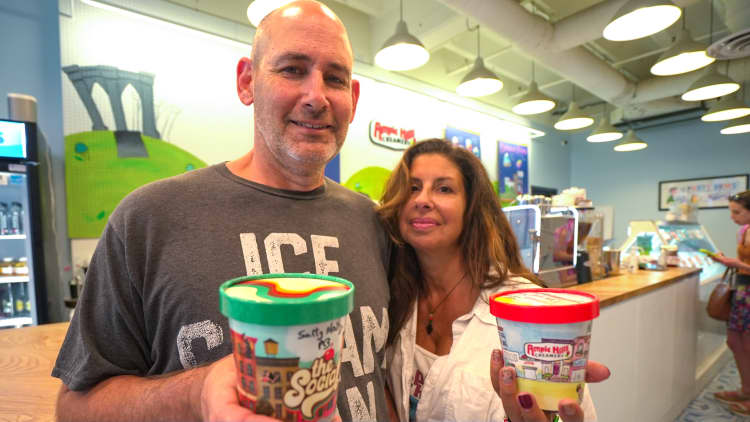Bernadette Joy's financial coaching business is called Crush Your Money Goals, which makes sense — she's got some experience on that front.
In 2016, the same year she graduated from the University of North Carolina's MBA program, Joy realized she and her husband had accumulated around $300,000 in debt between her student loans and two mortgages.
After tightening the household budget and aggressively paying down their loans, the couple found themselves debt-free by 2020. Then, Joy says, they turned their attention to their investment portfolio. These days, the couple's net worth is nearly $1.5 million.
It's a model that Joy recommends to her clients, even if it runs counter to conventional financial planning wisdom. "I have an ax to grind around the idea that you should pay off debt and invest at the same time," she says. "Humans suck at multitasking. Trying to do multiple things is just not good for us."
Here's why Joy recommends aiming to become debt-free before you invest.
Prioritizing debt payoff can make mathematical sense
When it comes to putting your income to work, Joy recommends dividing things into three buckets. Half of your income should go toward essential expenses: housing, utilities, transportation, food and health. Joy calls this bucket "survive." The other half gets split between money meant to help you "revive" and "strive."
Your "revive" money is your discretionary budget meant to be put toward things that bring joy and meaning to your life now. "Strive" is money you put toward financial goals.
"It's going toward my future self being happy," says Joy. "It's anything that's going to build your net worth."
So what builds your net worth faster: being debt-free or having a big portfolio? It's a question math can answer. That's because you can think of the interest rate on debt you owe as a "return" on any payments you make on the loan — the same way an increase in the price of stock you buy earns you a return on your investment.
"People get caught up in 'Do I pay off debt first, or invest?' and I'm like, do the no-brainer thing and pay off the debt, especially when the rates are so much higher," Joy says.
For certain types of debt, she makes a strong point. The average interest rate on credit card debt is nearly 21%, according to Bankrate, which is well above any return you can hope to consistently earn in the stock market.
Paying off debt first can make psychological sense, too
Joy doesn't just believe in prioritizing high-rate debt, such as a credit card balance, though. She believes in becoming totally debt-free before embarking on an investing journey. That means paying off everything, including student and auto loans.
For one thing, she says, paying off debt doesn't require you to learn anything, the way investing does.
"There aren't a lot of new skill sets you have to learn when paying down debt. You basically just have to press the button," she says. "Investing is a skillset that you have to spend more time learning."
Still, critics say, you're passing up potential gains by paying down debt with medium to low interest rates.
"I got a lot of flak for telling people you should potentially pause your 401(k) [contributions] if you have significant debt. People are like, 'You're missing out on compound interest,'" Joy says. "So then I show people my own trajectory of what it looked like when I paused putting money into my 401(k) and then undisputedly became a millionaire."
The secret to her success, and the success of many of her clients, is twofold, says Joy. First, they think of debt as a temporary problem. "I like deadlines. I say, 'Put an end date on it,'" Joy says.
By having her clients establish a finish line, it's easier to work backward and figure out how much money from their monthly budget needs to be set aside for debt payoff.
Then, once things are paid down, the second key is investing just as aggressively as you tackled your debt.
"It requires you to have a certain amount of discipline," Joy says. "A lot of people think, 'I don't have any more debt — I'm going to go buy a car, or a house.'"
By being aggressive in your debt payoff, and remaining aggressive in your investing, Joy says you can follow her example by building net worth one step at a time.
"One of the things that I strongly recommend, especially in times like these where people are really stressed, is focus on one thing and do it really, really well," Joy says. "Specifically, if you have debt, do that thing really well, first."
DON'T MISS: Want to be smarter and more successful with your money, work & life? Sign up for our new newsletter!
Want to earn more and land your dream job? Join the free CNBC Make It: Your Money virtual event on Oct. 17 at 1 p.m. ET to learn how to level up your interview and negotiating skills, build your ideal career, boost your income and grow your wealth. Register for free today.
CHECK OUT: Travis Kelce says he was ‘damn near dead broke’ during his rookie year in the NFL



